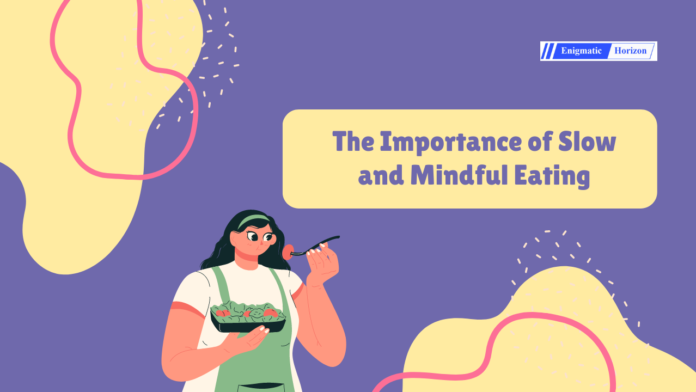Nowadays, it is common to see people eating quickly and restlessly. On the other hand, only a handful of people eat slowly and mindfully.
Mindful eating comes from the broader philosophy of mindfulness – a widespread, centuries-old practice used in many religions. Mindfulness is paying attention on purpose to your thoughts, feelings, and physical sensations right now. Mindfulness targets becoming more aware of one’s situation and choices, rather than reacting. When this concept comes to eating, eating mindfully means that you are using all of your physical and emotional senses to experience and enjoy the food. Here, we shall discuss the benefits of mindful eating. As we become more aware of our eating habits, we may have to take steps toward behavior changes that will benefit ourselves and our environment.
Mindful eating focuses one’s entire attention on the food that is eaten, internal and external physical signs, and one’s responses to those signs. It considers the wider field of the meal: how the food was prepared; internal and external cues that affect the amount we eat; how the food looks, tastes, smells, and feels in our bodies as we eat; how the body feels after eating the meal, whether to use deep breathing or meditation before or after the meal; and how our food choices affect our environment.
The opposite of mindful eating is sometimes called mindless or distracted eating, which is associated with anxiety, overeating, and weight gain. Examples of mindless eating include eating while driving, working, or viewing a television or phone, etc. Multitasking while eating has now become the new normal. But this often leads to less satisfaction with meals, less awareness of one’s food, and, often, overeating. This can eventually lead to problems like overeating.
Research has shown that eating with awareness can improve your mental health, make eating more enjoyable, and make you feel better about your body. A combination of behavioral strategies like mindfulness training and nutrition knowledge can lead to healthy food choices that reduce the risk of chronic diseases, promote more enjoyable meal experiences, and support a healthy body.
Chewing food well and eating slowly definitely has an impact on one’s health. Eating on the run or grabbing a quick bite is common in today’s fast-paced society. For many people, especially kids who are involved in multiple activities, such as school, games, travel, and more, sitting down at the table for a relaxed meal is very rare. Slowly chewing and eating benefits people in multiple ways. It makes meals more enjoyable, helps one to make better food choices, makes maintaining a healthy weight easier, improves digestion, and also gives one healthier teeth.
Tips to Help You Chew and Eat Slowly:
When one has a hectic schedule, it can be difficult to find the time to chew and eat slowly. To avoid such situations, one can avoid distractions such as TV and phones so one can focus on the meal. It is important to sit down while taking a meal, take a break between bites, set a goal of chewing enough times before swallowing, eat at designated times, and allow oneself at least 20 to 30 minutes to complete eating. Next, it is important to keep in mind that fresh fruits and vegetables are high in fiber, which is why they take more time to chew.
Challenges of mindful eating:
Practicing mindful eating can be challenging in today’s fast-paced environments. People have hectic work schedules, childcare responsibilities, and family commitments. Besides, the convenience of fast-food restaurants can create challenges as we try to incorporate mindful eating practices into our lives. Living in a world with a focus on productivity increases the temptation to grab fast food for a quick meal or snack on convenient, unhealthy snacks while working.
Strategies for Incorporating mindful eating
As practicing mindful eating can be challenging, we need to modify our environment, and alter our thought processes. Here are some ways that one might be able to practice mindful eating and make lasting changes to the way they eat.
Before eating, ask yourself: Am I hungry? Am I thirsty? What do I want to eat or drink? Reflect on how you feel – rushed, stressed, sad, bored, etc. As food should never be wasted, consider using smaller plates that allow you to easily control portion size. The use of smaller serving utensils also encourages the consumption of less food.
